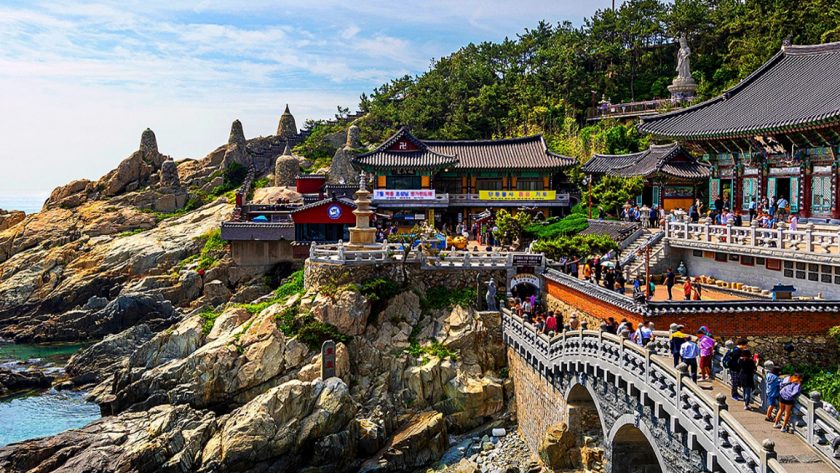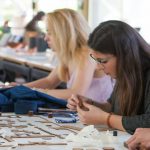I never thought that overcoming a bout of nausea in India would eventually lead to an internship in Seoul, Korea. While careening around sickening corners on a bus ride, my curry lunch threatening revenge, a kind Korean woman helped me make it to the next stop. She was my first introduction to Women Making Peace (WMP), the organization she worked for in Seoul. As a Korean-American, a student of conflict resolution, and an ardent feminist, I was intrigued by their program and set out to learn more.
As a non-governmental organization (NGO), WMP actively works to promote a culture of peace on the Korean Peninsula and in the world. Korean society, like many others around the world, actively and passively excludes women from governmental policy making. In contrast, WMP promotes women’s participation and leadership through peace education, leadership training, civil campaigns, solidarity activities, and networking amongst other peace and women’s organizations.
A semester later after scrambling for contact with WMP and applying for the McKenna International Grant to fund my way, I arrived in Seoul with minimal luggage and immense expectations.
Before my arrival, I had envisioned walking among low level clouds, coming upon a mystic Buddhist temple in surreal landscapes; the rumored hidden treasures of Korea. Instead, I found myself a month in Seoul without having ventured beyond the business district.
Every day I went to work at the Women’s House, a collection of NGO offices for woman’s programs. I climbed a flight of stairs that seemed to reflect the women’s and peace movements in Korea; built upon an uneven foundation, extremely precarious with almost insurmountably large steps. The five women who comprise the staff of WMP and I shared an office, where six desks laid end to end interrupt the chaotic atmosphere of the dorm size room. One day after 12 hours of continuous work, three hours spent jostled in an over-packed subway and bus, I came home exhausted and wondering what happened to the travel part of my internship abroad experience.
Although I was deeply committed to both the mission and activities of WMP, I found myself frustrated by the mundane administrative tasks. These tasks are highly critical, but unfortunately, extremely time consuming, with hours glazed over on the computer or learning the finer points of photocopying.
I felt that a vital part of my opportunities to experience Korean culture, to adventure into its scenic beauty, and to improve my language fluency was slipping past me daily. Sequestered in the office or tucked away into the formality of meetings, my contact with Korean culture seemed limited to advertisements on the subway and office-related mannerisms. My “scenic Seoul” consisted of unoriginal rectangular buildings abruptly punctuating the city’s skyline. My language growth was stagnant. The Korean that I was using lacked both fluency and practicality. Words like, “arms control,” “feminist movement,” and “peaceful Korean reunification” failed to enrich my ability to buy goods, order food, or figure out where in the world I was.
At this rather low point in my travel to Korea, I decide to delve deeper into my most important resource: my internship. From our first encounter, the women I worked with had extended warm smiles, and now I truly began to get to know them.
In growing closer to my coworkers, a very different perspective of Korea unfolded before me. At times, the women seem to embody what Korean society is not. For instance, in a society that favors more pedantic and authoritarian types of leadership, WMP’s head of staff is impish and innovative. She is known to burst into English whenever she remembers an English word and breaks into jovial recitals of traditional mask dances at random. The staff has revealed aspects of Korean culture to me in many forms. For instance, they have instructed me in the rather painful, yet admittedly effective, acupuncture techniques. The value of the day’s lunch break, our “quality staff time,” is emphasized. During this time, I am gifted by the attentions of five very Korean mother figures who constantly worry about my health, diet, sleeping habits, happiness, and adjustment to Korea. I began using this time as an opportunity to improve my Korean while gathering valuable practical information. They were more than happy to explain traditions, their daily lives, and anything that sparked my interest. In sharing with them my concerns and my disappointments, they have acted as my support team, my guides, and my friends.
Through the various conferences and meetings on eliminating the foreign military presence, banning landmines, and voicing women’s concerns, I perceive with a keener eye the festering scars of South Korea’s unhealed war wounds. Military bases interrupting nearby elementary schools. Barbed wire separating the two Koreas shattering the tranquility of a glorious sunset, a constant reminder of the possibility that tomorrow’s skies may open up with nuclear, chemical, or conventional weapons. An artificial culture of armed control and violence seeping into the private domestic realm, condoned by the immensely popular t.v. dramas and societal acceptance. These daily images of Korean life strengthen the staff’s resolve towards a Korean culture of peace and gender equality.
I recently attended Peace Camp, one of the many peace education-related activities that WMP organizes and directs, encouraging women to develop their own conception of a peace culture. A circle of women from eclectic and traditionally antagonistic backgrounds (former Korean-Americans, Korean-Japanese, North Korean women defectors, South Korean women) gathered together and shared their poignant life stories and their visions of a peaceful Korean Unification. The passage of time was marked by silent affirmations of divergent self-identity, deep sobs of heartache and pain, and sharp laughter. Tales of domestic violence, life in North Korea, fear, triumph, and joy unfolded at Peace Camp. Such collaborative learning, conflict resolution training, and fun activities were part of the agenda.
One night as I gave salsa lessons to this mixed group, I became extremely aware of how my internship gave me a unique insight into Korean culture and life. More than any scenic mountain image, the sight of such strong women, not intimidated by the obstacles to peace, shaking their age worn hips and enjoying their own comic relief, will forever be etched into my memories.
Teresa Park can be reached at tpark@cmcvax.mckenna.edu



